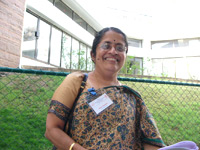 |
|||||||||||
|
|||||||||||
|
|||||||||||
|
Rohini Godbole of the Indian Institute of Science, who hosted the combined workshop of LCWS06 and the third Global Design Effort meeting, sees the value of combining the phenomenologists, theorists, experimentalists, accelerator physicists, and people from industry to come together in one place. "I've been involved in linear collider physics since 1990," Godbole says. "Some work on hadron production in two photon reactions that we did at that time had interesting implications for the backgrounds in an e+e- collider and hence for design considerations for the linear collider. For me that was an interesting experience which had actual implications for what should be the bunches and sizes in the linear collider." Godbole emphasizes that the uniqueness of this workshop is the joint meeting of the GDE and LCWS06. For her, this is an indication of the days to come. "More and more direct interactions between accelerator physicists, particle theorists and particle experimentalists are happening. All have to work simultaneously for the construction of this activity to be useful. To me, that's exciting as well as very challenging," she said. India had several reasons for wanting to host the meeting at this time. "India has a very strong background in accelerator physics, and we have an equally strong background in detector physics," she said. "Indian industry has built magnets for LHC, and there is a lot of work on linac and superconducting cavities in India. In the LHC experiments, our scientists are setting up many of the analysis routines, and theorists and phenomenologists have been very hard working on this subject. My idea in this is that all these communities in India get together here to see how they can really contribute to ILC related programs. My feeling is because of this workshop, the Indian community will become more active in ILC related subjects. I'm hoping this would result in getting a higher participation from the Indian accelerator physics community and industry into this exercise." During the workshop, Godbole organized a special session for industry. "To that end, we are also trying to invite some of the big Indian industries here who have experience making magnets," she said. The Indian industries met with the Japanese industries on 10 March. "It was my first time to get to know the people in Indian industry, " Masanori Matsuoka, Mitsubishi Heavy Industry says. "To me, this is a great opportunity to get to know each other." A member from Japan Linear Collider Forum, two Japanese companies and five Indian companies were present at the meeting. "I got an impression that we could work together to sort out common and symbolic issues such as 'industrialization'. We would gradually like to build our relationship for the long term," Matsuoka said.Godbole also hosted an educational and outreach workshop for physics teachers, with the Educational Panel of Indian Academy of Sciences and the help of the Fermilab QuarkNet team, Marge Bardeen and Robert Peterson. Three Indian physicists participated as resource persons by giving lectures on 10 and 11 March. Organizers intended this outreach workshop to enable the teachers and students in Bangalore and other surrounding areas to participate in the study of extensive air-shower cosmic rays. The QuarkNet team brought a detector to involve students in a search for extremely energetic cosmic rays. The participants learned how to use the Grid-enabled e-Lab that allows students to upload and analyse data. They can also use the e-Lab to communicate results to students at home and abroad. Twenty-five teachers worked in four groups at the two-day workshop. This process familiarised the teachers and physicists in the area with the detector and the experiments. This group will go on to mentor young students, ages 16 to 18, who are about to graduate from high school. "So it is the younger generation which has to be involved and I'm quite hopeful on that account," Godbole said. -- Youhei Morita |
|||||||||||
| © International Linear Collider |
